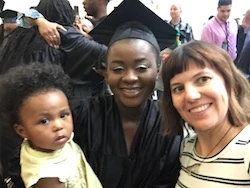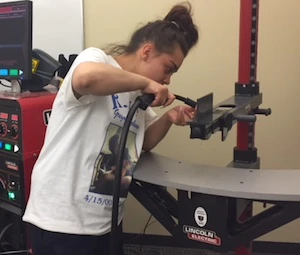Published 2018
Minnesota Expectant and Parenting Student Program
 "[MEPSP] has helped me think about different ways of parenting and how to do better in school so that I can do better for my child."
"[MEPSP] has helped me think about different ways of parenting and how to do better in school so that I can do better for my child."
- MEPSP participant
Program Description
The Minnesota Expectant and Parenting Student Program (MEPSP) provides coordinated case management for expectant and parenting teens and young adults in communities with high levels of need. By referring participants to health services and addressing barriers to their educational achievement, MEPSP prepares expectant and parenting youth for healthy and successful futures.
- Population: Expectant/parenting teens and young adults (ages 10 to 24) with an emphasis on youth of color, including American Indian youth
- Locations: The City of Minneapolis, the City of Bemidji, and Hennepin, Kandiyohl, Renville, Beltrami, and Cass counties
- Partners: Minneapolis Health Department, Minnesota Visiting Nurses Association, Kandiyohl County Health and Human Services, Northwest Indian Community Development Center, White Earth Nation, Red Lake Nation, Leech Lake Band of Ojibwe, Minnesota Department of Education, Minnesota Office of Higher Education
Goals
- Help expectant and parenting youth complete high school or other educational programs by addressing barriers to their educational or vocational goals.
- Improve the well-being of expectant and parenting youth and their children, through referrals to and use of services related to health, parenting, self-sufficiency, and more.
Strategies
Case management
Each participant is assigned a primary case manager—a nurse, social worker, or community health worker—who meets with them and assesses their family’s housing, health, educational, or other needs. Case managers identify barriers to participants’ health and educational achievement and make referrals to support services. In some locations, case managers also provide qualifying families with emergency financial support for expenses like car repairs and utility bills.

All case managers are trained in trauma-informed care and adolescent brain development, which builds their capacity to understand the challenges participants face and provide them with services that meet their needs. For example, case workers invest in building relationships between participants and service providers to increase the likelihood that participants will initiate and continue accessing services. Case managers also track identified issues over time, checking in with youth to monitor their health and progress towards educational goals.
State-level partnerships
The Minnesota Department of Health (MDH) leverages its existing relationships with several state agencies —including the Minnesota Departments of Human Services, Employment and Economic Development, and Education — to conduct outreach and provide information and training to local program providers about the Minnesota Expectant and Parenting Student Program, adolescent brain development, and trauma-informed care. MDH has also invited state-level partners to participate in an MEPSP Advisory Committee, which will discuss topics related to the long-term success of MEPSP.
Stats at a Glance
Of participants surveyed after the first 10 weeks of MEPSP:
- 96% felt more confident about accomplishing educational goals
- 92% said the program increased chances of getting a job after graduation
- 91% said participation increased their knowledge of topics related to pregnancy, parenting, and child development
In Focus: MSPSI, 2010-2017
MEPSP is based on the success of the Minnesota Student Parent Support Initiative (MSPSI), an earlier program also funded by the OAH PAF program. MSPSI served expectant and parenting students and their children in nine colleges and universities with trainings, screenings, and emergency financial assistance, thus helping participants accomplish their post-secondary education goals and promoting the health of youth and their children.
Grantee Information
Elizabeth A. Gardner
Program Coordinator
651-201-5411
Elizabeth.gardner@state.mn.us
www.health.state.mn.us
Print the full success story here.
About the PAF Program
The Office of Adolescent Health Pregnancy Assistance Fund (PAF) program provides funding to states and tribal entities to improve the health, educational, social, and economic outcomes of expectant and parenting teens, women, fathers, and their families.
 An official website of the United States government
An official website of the United States government